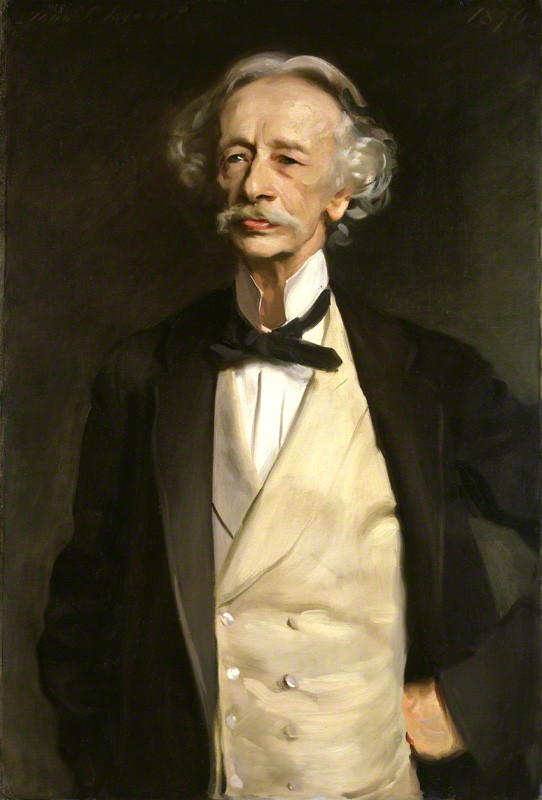“The proper study of mankind is woman.”
Vol. II, Ch. V Aphorisms and Extracts, p. 77.
Memoirs and Correspondence (1900)
Coventry Kersey Dighton Patmore was an English poet and critic best known for The Angel in the House, his narrative poem about an ideal happy marriage.

“The proper study of mankind is woman.”
Vol. II, Ch. V Aphorisms and Extracts, p. 77.
Memoirs and Correspondence (1900)
Book I, Canto III, III Unthrift.
The Angel In The House (1854)
The Toys, p. 50.
The Unknown Eros and Other Poems (1877)
Peace, p. 28.
The Unknown Eros and Other Poems (1877)
“Life is not life at all without delight.”
Victory in Defeat, p. 36.
The Unknown Eros and Other Poems (1877)
Book I, Canto VIII, II The Revelation.
The Angel In The House (1854)
Book I, Canto VI, IV A Riddle Solved.
The Angel In The House (1854)
Book I, Canto III, II Love a Virtue.
The Angel In The House (1854)
“To have nought
Is to have all things without care or thought!”
Legem Tuam Dilexi, p. 47.
The Unknown Eros and Other Poems (1877)
Magna est Veritas, p. 62.
The Unknown Eros and Other Poems (1877)
Book II, Canto VIII, III The Kiss.
The Angel In The House (1854)
Book II. Canto IX, II The Foreign Land.
The Angel In The House (1854)
“None thrives for long upon the happiest dream.”
Tired Memory, p. 95.
The Unknown Eros and Other Poems (1877)
Book I, Canto VIII, III The Spirit's Epochs.
The Angel In The House (1854)
“Modern Philosophers, that wisely keep to sandy shallows, like shrimps, for fear of bigger fish.”
Vol. II, Ch. V Aphorisms and Extracts, p. 76.
Memoirs and Correspondence (1900)
“Life's warp of Heaven and woof of Hell.”
Vol. II, Ch. V Aphorisms and Extracts, p. 75.
Memoirs and Correspondence (1900)
“The enthusiasm for goodness which shows that it is not the habit of the mind.”
Vol. II, Ch. V Aphorisms and Extracts, p. 75.
Memoirs and Correspondence (1900)
“Nothing remains with man unless it is insinuated with some delight.”
Vol. II, Ch. V Aphorisms and Extracts, p. 74.
Memoirs and Correspondence (1900)
Vol. II, Ch. V Aphorisms and Extracts, p. 74.
Memoirs and Correspondence (1900)
Vol. II, Ch. V Aphorisms and Extracts, p. 72.
Memoirs and Correspondence (1900)
“The cloud that is light to Israel is darkness to Egypt.”
Vol. II, Ch. V Aphorisms and Extracts, p. 71.
Memoirs and Correspondence (1900)
“Nothingness is capacity, and night the opportunity of light.”
Vol. II, Ch. V Aphorisms and Extracts, p. 68.
Memoirs and Correspondence (1900)
Vol. II, Ch. V Aphorisms and Extracts, p. 66.
Memoirs and Correspondence (1900)
“It is one thing to be blind, and another to be in darkness.”
Aurea Dicta XLIV, p. 15.
The Rod, the Root, and the Flower (1895)
Aurea Dicta XX, p. 8.
The Rod, the Root, and the Flower (1895)
Aurea Dicta VI, p. 4.
The Rod, the Root, and the Flower (1895)
Magna Moralia XLIX, p. 201.
The Rod, the Root, and the Flower (1895)
Magna Moralia XLII, p. 193.
The Rod, the Root, and the Flower (1895)
“God is the only reality, and we are real only so far as we are in His order, and He is in us.”
Magna Moralia XXII, p. 172.
The Rod, the Root, and the Flower (1895)
Magna Moralia XI, p. 156.
The Rod, the Root, and the Flower (1895)
“The beauty in her lover's eyes
Was admiration of her own.”
Book II, Canto II, III Lais and Lucretia.
The Angel In The House (1854)
Book II, Canto I, V Perspective.
The Angel In The House (1854)